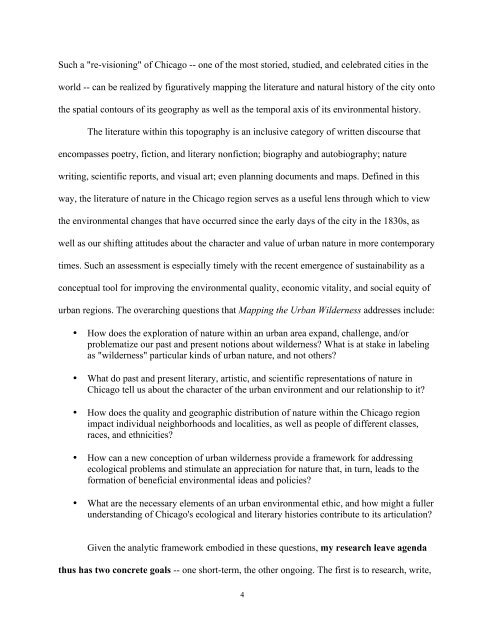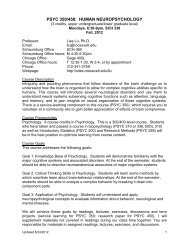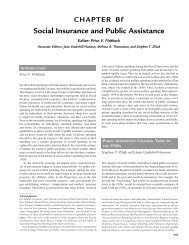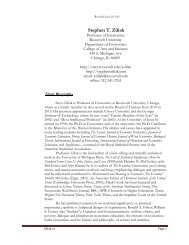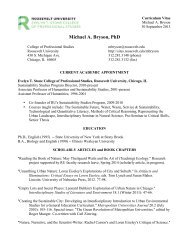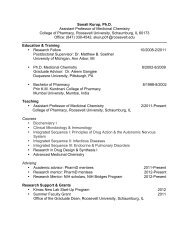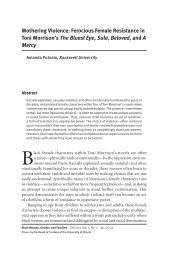Reading the Book of Nature
Reading the Book of Nature - Roosevelt University Sites
Reading the Book of Nature - Roosevelt University Sites
Create successful ePaper yourself
Turn your PDF publications into a flip-book with our unique Google optimized e-Paper software.
Such a "re-visioning" <strong>of</strong> Chicago -- one <strong>of</strong> <strong>the</strong> most storied, studied, and celebrated cities in <strong>the</strong><br />
world -- can be realized by figuratively mapping <strong>the</strong> literature and natural history <strong>of</strong> <strong>the</strong> city onto<br />
<strong>the</strong> spatial contours <strong>of</strong> its geography as well as <strong>the</strong> temporal axis <strong>of</strong> its environmental history.<br />
The literature within this topography is an inclusive category <strong>of</strong> written discourse that<br />
encompasses poetry, fiction, and literary nonfiction; biography and autobiography; nature<br />
writing, scientific reports, and visual art; even planning documents and maps. Defined in this<br />
way, <strong>the</strong> literature <strong>of</strong> nature in <strong>the</strong> Chicago region serves as a useful lens through which to view<br />
<strong>the</strong> environmental changes that have occurred since <strong>the</strong> early days <strong>of</strong> <strong>the</strong> city in <strong>the</strong> 1830s, as<br />
well as our shifting attitudes about <strong>the</strong> character and value <strong>of</strong> urban nature in more contemporary<br />
times. Such an assessment is especially timely with <strong>the</strong> recent emergence <strong>of</strong> sustainability as a<br />
conceptual tool for improving <strong>the</strong> environmental quality, economic vitality, and social equity <strong>of</strong><br />
urban regions. The overarching questions that Mapping <strong>the</strong> Urban Wilderness addresses include:<br />
• How does <strong>the</strong> exploration <strong>of</strong> nature within an urban area expand, challenge, and/or<br />
problematize our past and present notions about wilderness? What is at stake in labeling<br />
as "wilderness" particular kinds <strong>of</strong> urban nature, and not o<strong>the</strong>rs?<br />
• What do past and present literary, artistic, and scientific representations <strong>of</strong> nature in<br />
Chicago tell us about <strong>the</strong> character <strong>of</strong> <strong>the</strong> urban environment and our relationship to it?<br />
• How does <strong>the</strong> quality and geographic distribution <strong>of</strong> nature within <strong>the</strong> Chicago region<br />
impact individual neighborhoods and localities, as well as people <strong>of</strong> different classes,<br />
races, and ethnicities?<br />
• How can a new conception <strong>of</strong> urban wilderness provide a framework for addressing<br />
ecological problems and stimulate an appreciation for nature that, in turn, leads to <strong>the</strong><br />
formation <strong>of</strong> beneficial environmental ideas and policies?<br />
• What are <strong>the</strong> necessary elements <strong>of</strong> an urban environmental ethic, and how might a fuller<br />
understanding <strong>of</strong> Chicago's ecological and literary histories contribute to its articulation?<br />
Given <strong>the</strong> analytic framework embodied in <strong>the</strong>se questions, my research leave agenda<br />
thus has two concrete goals -- one short-term, <strong>the</strong> o<strong>the</strong>r ongoing. The first is to research, write,<br />
4


